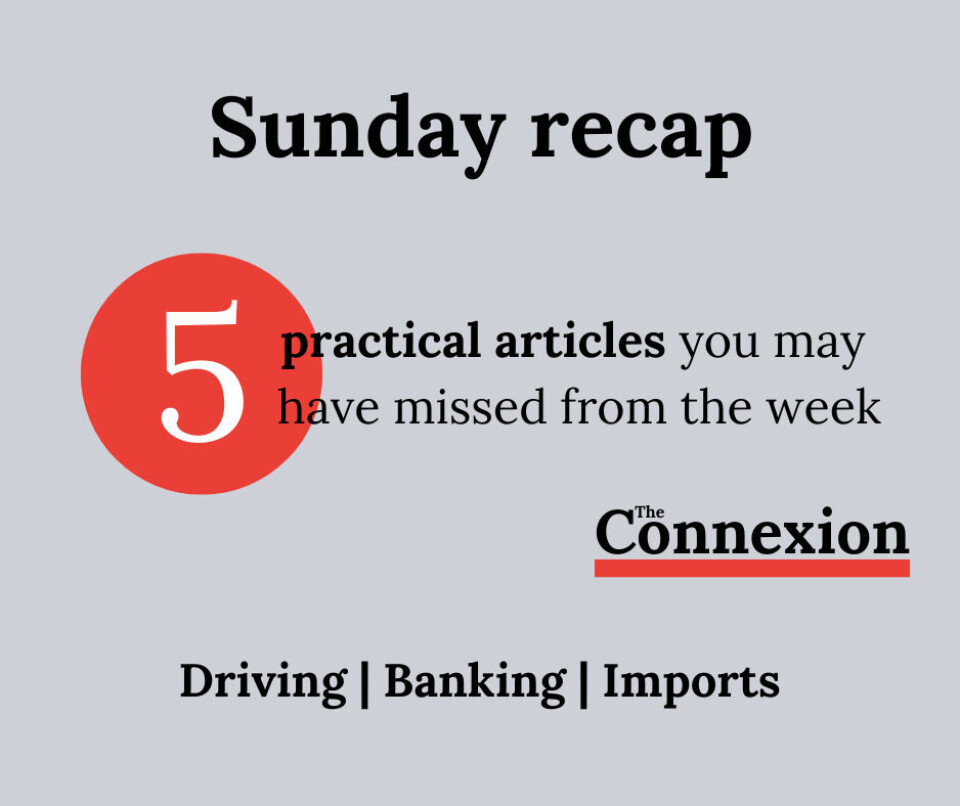-
French doctors begin 10-day strike: most GP surgeries expected to close
Patients needing care should turn to pharmacies, on-call doctors, or emergency wards
-
French weekly weather forecast January 5 - 9: bitter cold and snow
Up to 10cm of snow is due in Brittany and Normandy. Toulouse, Dordogne and the Pays Basque will also see flocons
-
Free fraud service for UK homeowners living in France
Owners are encouraged to sign up for a free monitoring service from HM Land Registry to reduce risk
Road signs, petrol costs, customs advice: French practical wrap
Our overview of practical stories you may have missed this week

1. What do new French road signs mean?
A new road sign – indicating a car-sharing lane – is becoming a more common sight on French roads.
The sign, which is a white diamond, indicates a lane is only open to cars with multiple people inside or certain other vehicles like electric cars.
It is now being used on motorways in the east of France but is set to be used in cities in the west like Rennes and Nantes from September.
It is one of the various plans to reduce emissions from vehicles and get more cars off French roads.
We also wrote an article about how driving will change in Paris for the Olympics, which mentioned the new temporary and permanent road signs set to be installed around the capital.
Read more: This road sign is popping up more and more in France
2. The little-known medical surcharge that might be doubled
The franchise médicale - a €0.50 surcharge on boxes of medicine in France - could be doubled in the coming months.
The surcharge is also applied to a number of other treatments such as speech and physiotherapy appointments, but is not well known to most people.
Sometimes, when you do not need to pay upfront, the surcharge is deducted from your next reimbursement from the Assurance Maladie (French social security).
Future plans could see this raised to €1, both as a cost-saving measure and to prevent people taking medicines unnecessarily.
A number of people have criticised the idea, however, calling it “nonsense.”
Read more: What is France’s ‘franchise médicale’ fee and why might it go up soon?
3. How to find cheaper petrol as fuel costs continue to rise
Despite claims inflation is beginning to fall, drivers are still feeling the pinch at the pumps.
This article provides a number of tips, however, to help find more affordable petrol next time you need to fill up.
The main tips are to use price comparison websites and interactive maps to search your nearby area for the best deal.
If taking a longer drive, you can plan where to fill up more effectively, as prices can change on different departments and roads.
Read more: Tips on finding low-cost fuel as French petrol prices keep on rising
4. Neobank gives French IBAN
German neobank N26 (which has no physical stores like a traditional bank) is one of the first to offer customers in France a French IBAN.
An IBAN is needed for a number of administrative processes, meaning those who only use a neobank and not another French bank account will no longer find it so difficult to do things such as set up utility bill payments.
New customers will automatically receive one, and existing customers are expected to be switched over to a French IBAN by the end of the year.
The change means, however, that they have to declare the closing of a foreign bank account on their next tax declaration to the authorities if they already owned an account with the neobank.
Read more: Neobank N26 gives customers in France local IBAN numbers
5. New online service to help you declare imports
The DéclareDouane website is a new service that allows users to better manages imports of items brought into France, such as alcohol and other luxury goods.
The website will let you know whether customs taxes will need to be paid on the items you are bringing into France from outside the EU.
A future update will also allow you to pay these costs in advance, allowing for a smoother border crossing.
Our article gives an explanation of how to use the website, and other useful contacts in the Douanes (customs) department.
Read more: New website in France helps you work out tax for non-EU imports
























